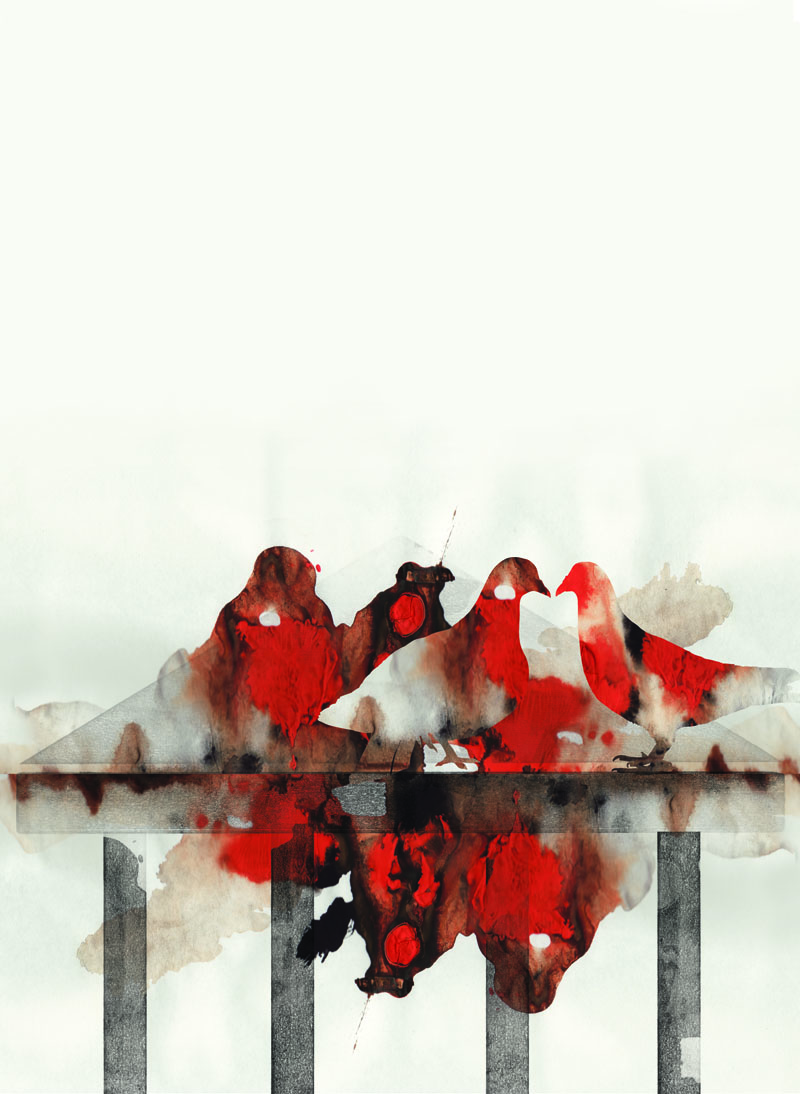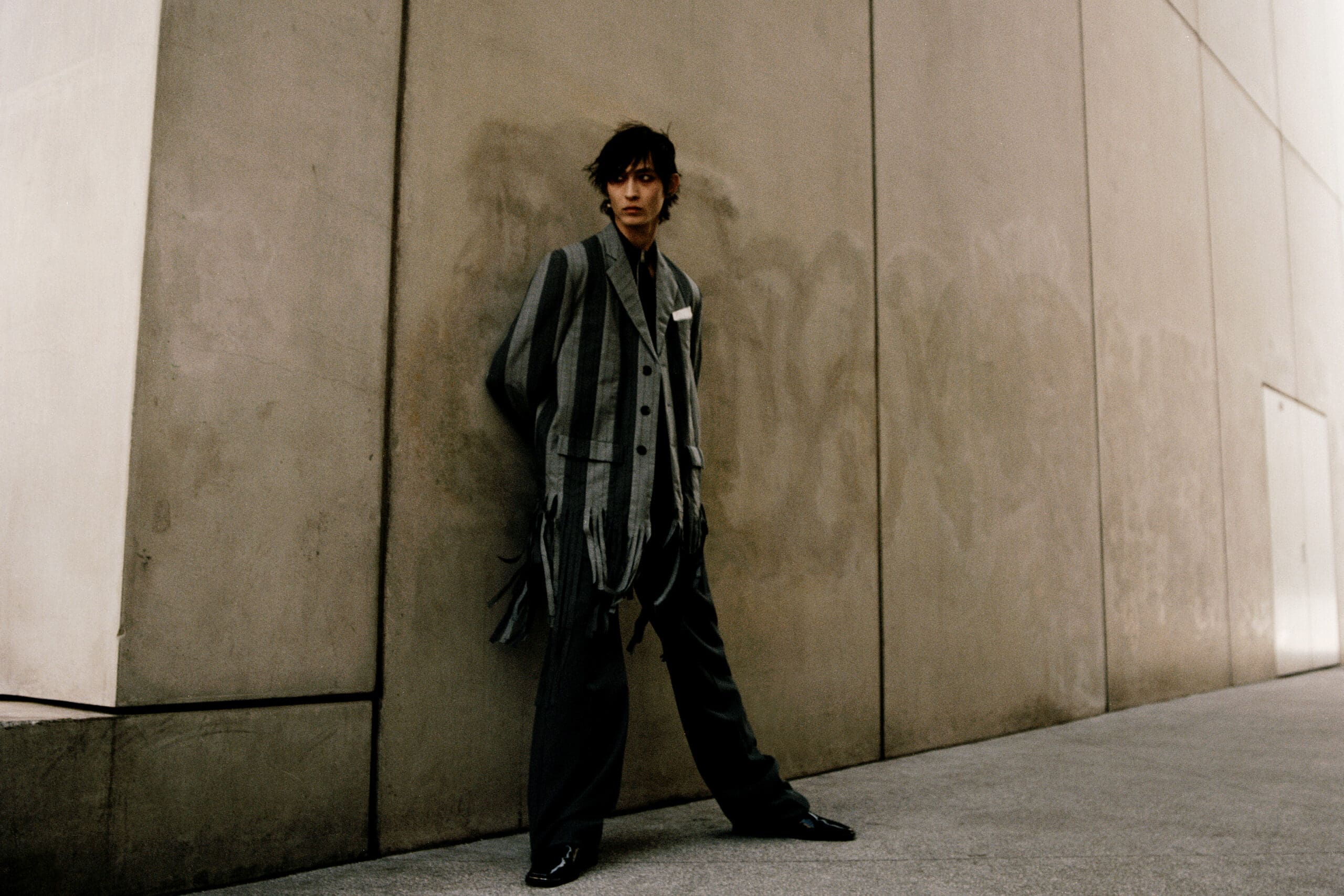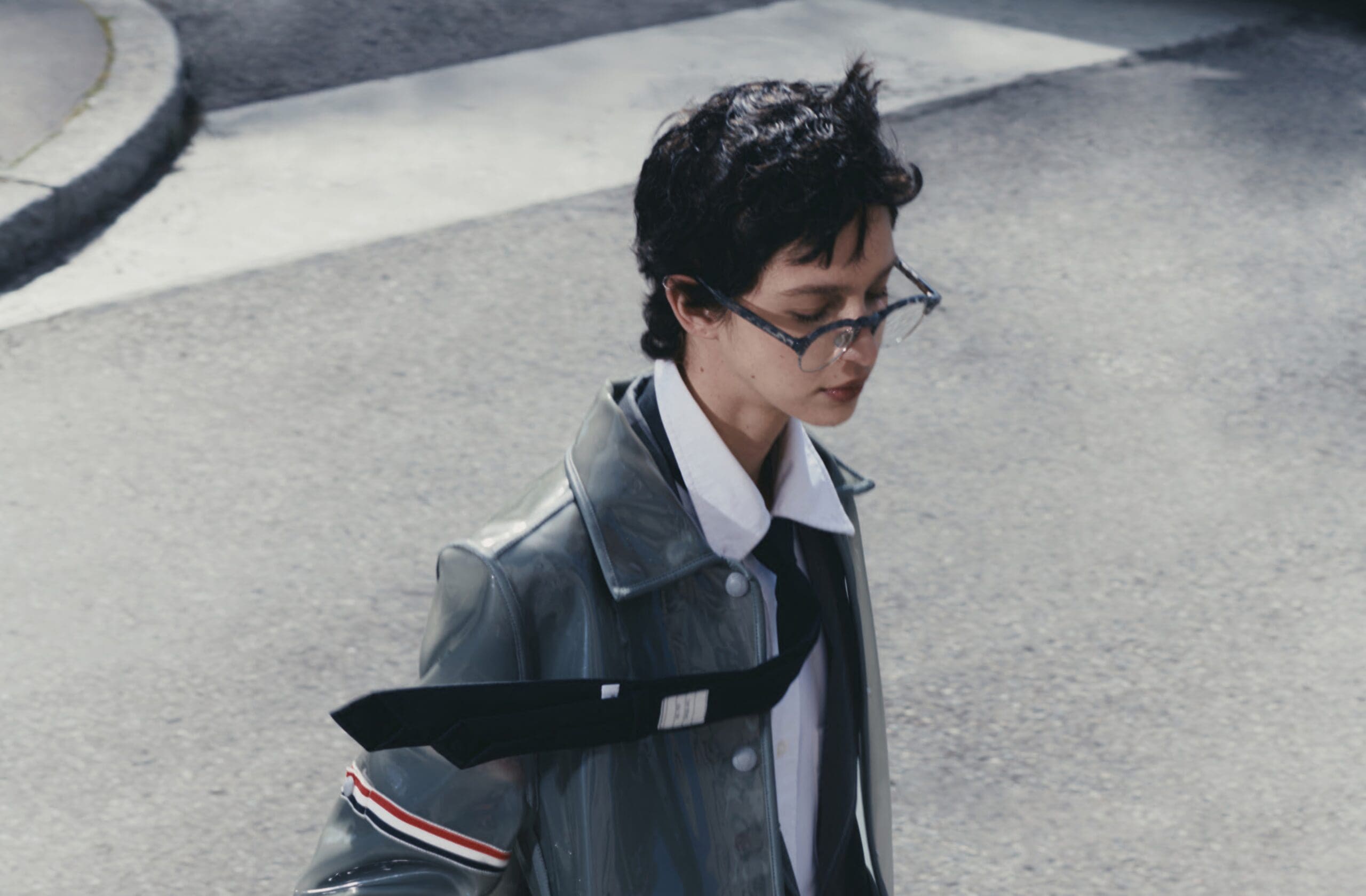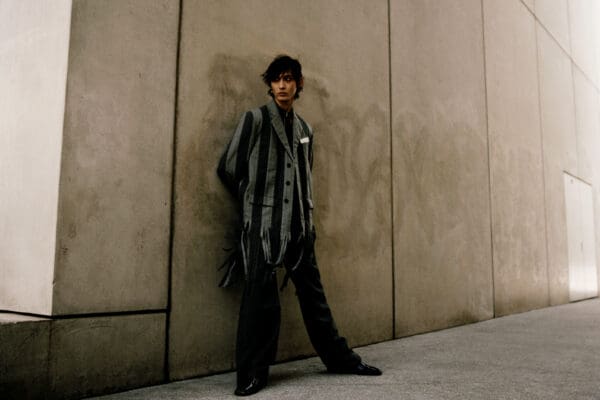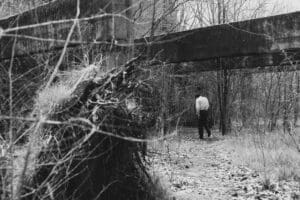by AARON AKIRA
illustrator MICHAEL SALU
ISSUE V
Roma is beautiful and Roma is empty. It is free of pedestrian weight and it is where we are taking our honeymoon. We are sitting on cool stone steps and marveling at the sepia sunlight, the taste of basil in our mouths.
—-
Upon arrival in Roma we are overwhelmed by monuments. There are more monuments in Roma than a pair of lovers could kiss beneath in a lifetime of kissing beneath monuments (some other, better lifetime). We are not certain how long our Roma sojourn will last—we have not purchased return tickets—but we know we will never make it to every last monument.
First we are ambitious. We careen from piazza to piazza, laughing and delirious. We pause for breath only when I am nearly run down by a Vespa. You ask me if I saw how the pigeons perched on the outstretched hand of the Vittorio Emmanualle II statue: in couples, like little spouses. Although we have been in Roma only two days you aver it was the highlight of the trip so far: just holding hands and birdwatching.
I do not remember the Vittorio Emmanualle II statue. We were moving so fast… In fact I do not even remember holding hands.
I apologize sincerely, and you forgive me. But henceforth we proceed at a humbler pace. One monument at a time. We still don’t know when we will leave Roma, or if we will leave, but now we linger like pigeons in each piazza, preferring to behave as though, like Vittorio Emmanuel II, we will stay in Roma forever.
—-
We plan exhaustively before setting forth to Roma. We accumulate a small library of guidebooks, maps, and narrated art-walks on tape. Before we have even booked our bed and breakfast we become cultural experts. We know precisely which landmarks we aim to “do” each day, and how many paces separate them.
But upon arrival in Roma we find ourselves unwilling or uninspired to leave our B&B. There is a balcony, for one thing. Several landmarks are visible from there and we count them as we eat our complementary breakfast of Swiss yogurt and cornetti. In our bedroom there is an antique globe and a fortuitously positioned mirror. From our bed we can see all we need to see.
—-
In Roma we set aside an afternoon to write postcards to everyone we have ever loved. The gentleman at the ufficio postale informs us that addresses in the hereafter can indeed be reached, but the postage is molto caro.
What the hell, we say. We’re on vacation!
Sitting on a bench in the Piazza del Popolo we realize we have a great deal to say to our dead loved ones: Roma is lovely, we wish you were here, carciofi are in season. But the postcards we bought are very small, and so, much as in life, we feel we have barely said hello to our loved ones when abruptly we run out of
—-
In Roma we encounter an awkward situation. Over lunch I suggest visiting the temple on the lake at the Villa Borghese and you fear that I may be planning to propose. You believe that is what people do in Roma, and it is not altogether an irrational fear. After all, I love you.
But noticing how seriously you take my innocent suggestion to visit the temple, I get the jitters. I have not brought a ring and have no idea where to purchase one in Roma. Moreover, I am young and poor. I cannot afford a ring! I am letting you pay for half of lunch for the sake of necessity, not sexual equality! What sort of groom would I make, who cannot even pay for a panino? And where would we go on our honeymoon, seeing as we’re already in Roma?
Furthermore, I might protest that I had no such thing on my mind in the first place. But it is merely the Villa Borghese that we are discussing, merely a temple. I drain my espresso and say nothing. After lunch we wordlessly wander, too afraid to even hold hands.
This gets lonely after a while and so at a bus stop we resort to feeling each other up. We agree to venture to the temple on the lake at the Villa Borghese. Since in Roma every stoop and doorstep is suggestive and romantic, we might as well stop treating such circumstances as anomalous and fraught with peril and commitment. On the bus to the Villa Borghese we play dominoes.
The temple on the lake, we discover later, is non-denominational: a temple to nothing in particular, built in the nineteenth century because it looked nice on the lake.
—-
In Roma you become frustrated with my photography. By now I have taken twenty digital stills of you in front of twenty monuments! But you point out that in most of them I have cropped out the monument in question and focused on your face.
I protest that I am a portraitist, like Raffaello.
You indicate where I have cropped the painted Madonna at Raffaello’s tomb at the waist, so as to include in the photo your new shoes, which we bought at the Tod’s outlet in the countryside.
They are really good shoes, I insist.
But we are in Roma!
You go on to tell me that with such a wealth of ageless historical beauty and flavor and mystery surrounding us, in these streets where Garibaldi fought for unity, where Anita Ekberg cavorted in the Fontana di Trevi, where pasta all’amatriciana was arguably born; that here, the enthusiasm of my attention to you, which seems indifferent to our environment, which is as joyous and wide-eyed in the metro as at the Villa Borghese gardens, causes you to fear that I may be missing things—that I may have come to Roma for the wrong reasons.
On the contrary, I have a very good reason!
—-
In Roma we spend a day apart. We don’t know how this comes about. It is a big city, after all. One gets lost.
For a whole day I have no idea what you are doing. No idea what you might see, who you might visit, what you might eat, the vintage of wine you might drink, how much wine or how quickly, in what company, whether it is any good, what you might be thinking (or where such thoughts might lead).
And you! You have no idea where it is I’m wandering, who it is I’m meeting, that I decide to visit the Pantheon and spend several hours reading history in a nearby piazza before returning to our bed and breakfast.
I will never know that, with a circumstantial kind of secrecy, you returned to that gelato shop where a pretty Roman boy scoops alone. And—in a fit of decadence—you ate gelato. Unbeknownst to me, it was melone, and it was delicious.
You will never know certain facts about the Pantheon.
When in the evening, as if by accident, we rejoin each other, each of us presumes the other’s day has been more interesting than our own. We become self-conscious. And so you say nothing about gelato, and I do not tell you about the Pantheon, even though it is very mysterious and continues to fascinate me.
—-
Between us and the Etruscan bowl, there is more than glass. It is perfectly inscrutable. A message is engraved on its brushed black surface but neither the museum nor modern scholarship can provide a translation. So the bowl sits encased and handsomely lit, dressed in its alien script, a negative artifact that tells us nothing. What moves us is the familiarity of the human figures who dance around its circumference. They have laughter and expressive eyebrows and we feel they could as well be ourselves, twenty-four hundred years ago.
We pass a morning in translation, exchanging guesses like caption contests. Mostly humorous, until the museum keeper, a nun volunteer, shushes us. In the evening after dinner a memorable torta lashed with several toasts of grappa effaces it all. But later, sleeping where we fell, the Etruscan phrases we coined still jingle in our heads somewhere, only as lost as centimes in a deep well, or the original meaning.
—-
The language fails us, or we fail the language.
In Roma there is a famous fountain called Trevi, named for the virgin who led the builders of the aqueducts to water. Popular superstition holds that anyone who throws a coin into the fountain of the virgin is assured of a return to the fountain of the virgin someday.
Standing beside you at Trevi, I worry that to return means we will have left.
Or, you say, we have to leave so that we can return.
But as we search our pockets for change, we wonder whether there can be a true return to the fountain. Is it the same fountain, still virgin, if you have already thrown in your coin, and are returning?
It is a legitimate concern. It is why we’d prefer to remain indefinitely in Roma.
From below we gaze up at Trevi, who weathers our interpretation and our fears. She is made of stone. With our thumbs in each other’s belt loops we hurl our coins, hoping to someday repeat the gesture.
—-
We have not made plans but in our hearts we know that one day Roma will depart from us. It is a hard vision to sustain. Like now, as we hike down the Via della Conciliazione to see the Basilica di San Pietro, and all we can see is the Basilica di San Pietro. Formerly the via was occupied by a row of buildings that obscured a visitor’s destination, but in 1936 the vista was cleared by Mussolini, who evidently had no patience for the delays and surprises of Baroque architecture.
Dusk gathers as we walk. The season may be changing. With my jacket over your shoulders you are like an angel obliged to walk with her wings folded. We are almost silent, with the Basilica crowding our eyes. We agree that its beauty is somehow profligate and if there were a beggar around we would rid ourselves of some lire.
In the Basilica itself, where nuns and art history students are closing the place around us, we recite the familiar oohs and ahhs that religious art inspires. But nothing prepares us for our departure from the Basilica.
What was merely beautiful upon entry becomes unforgettable upon exit. The trapezoidal shape of the piazza fans out before us like a hero’s cape, suffusing the same stones we strode in on with a sense of adventure and possibility.
—-
To remain in love in Roma is a great challenge for us. Because in Roma love can seem very conditional, even precarious.
One must resist the temptation to kiss strangers, which is stronger in Roma than in other cities.
One must at times tear one’s eyes from architecture, from a painting, from a heartrending sunset to gaze instead at one’s lover, who can seem somewhat transitory in comparison.
Then, amid so many feasts, one must save some hunger for this lover, who is not so reliably palatable as the cuisine of Roma.
Meanwhile, of a lover in Roma one can expect nothing, or nothing that can be anticipated with any clarity. From a lover in Roma, as from the city itself, one can hope only for pleasant surprises. Around each street corner, a squeeze of the hand, a flower shop, a quick kiss, a fresco, a coin thrown into a fountain. On this diet of wonder and uncertainty a lover in Roma must survive.
To our continual amazement, we are able to meet these conditions.
—-
Neither of us is keen to climb the Scala Santa on our knees. Convention insists it must be done this way—as though we have been unfaithful to Jesus, and are asking to be taken back.
If Jesus were my ex, you say, He’d be a kind one. He’d meet me halfway.
Nevertheless we have paid admission and stand at the foot of the crowded steps feeling strangely compelled to join the pageantry before us. Our stay in Roma won’t last forever. Around us many pilgrims—decades our senior, from faraway nations—are heaping their knees upon the steps, like a regiment of cripples instructed to take a hill. No one complains. Tally ho!
After all, it is not entirely Jesus they are following—it is each other, the warmth of the convention itself. The pilgrims struggle upwards together, huffing and gasping, reenacting a reenactment of Jesus’ holy footfalls in Pontius Pilate’s palace. For protection the marble steps are covered in wood but the hall still echoes like a shared history.
Kneeling and linking arms, I know who it is I’m following in this sack race of forgiveness. It’s the first time we’ve touched since morning. I can’t know for certain whom you’re following, though, and the Scala Santa remains a test of faith.
—-
What do you even talk about, after a year together in Roma?
By now you’re over the espresso. You need five to raise an eyebrow.
Even your table is reserved.
You don’t talk about home, where by now you must be unknown.
Long walks alone resist translation. You attempt. You sit down and mention some location and soon feel like the stranger you passed, who turned to you and opened his mouth, then closed it, having mistaken you for someone.
You can’t rake through mutual friends anymore, because by now each has confided some indiscretion to you and you alone. Your honor has no comment.
There is the past—your past together—but since you’ve shared it, you behave as though it’s understood. Once in a while you correct one another.
There is the future, but when isn’t there?
Money is something you’re sick of.
Tourists are unmentionable.
Labor strikes are like the weather; you don’t bother.
—-
This morning I said unkind things about some street art you bought. This is another thing we’ll remember.
—-
Garibaldi! Where are you going?
Garibaldi is in retreat!
Who are we meant to follow now, his followers ask, now that Roma has fallen again to the French? They offer to fight in the streets for Roma.
Rifiuto, he says. We take to the mountains. Where have you put my steed?
But, his followers implore, in the mountains there are insects!
Garibaldi nods gravely.
Furthermore there is no privacy. Wild boars, always prying. Whereas in comparison Roma offers us running water, well-stocked bordellos, keen pecorino, paved streets, Frascati, white truffles, many of our wives…
Garibaldi regards Anita, his beautiful companion, pregnant and determined, who will soon die of some malady on a farm as they retreat. In his wisdom, which borders on clairvoyance, Garibaldi can almost foresee this. Sadness shades him, like a cloud gliding overhead.
… warm beds, barbershops, stuffed peppers…
He can envision momentarily the cleared stable, the embers of campfires, the coarse blankets smelling of horse, soaked in the sweat of Anita’s fever, her eyes clenched shut, then not. He can hear his own prayers, and the weeping of his followers, and see her pale brow grow smooth in death, like the surface of a lake they passed that afternoon.
… and no less than seventy flavors of gelato, including melone, to choose from.
Basta, says Garibaldi, emerging from his reverie. Anita hands him his steed. He lifts his bearded chin as the sun beams down. In the presence of his men he forgets what he has dreamed.
Dovunque saremo, Garibaldi says famously, cola` sara` Roma.
Wherever we are, there will be Roma.
(Wild cheering.)


